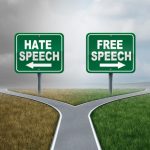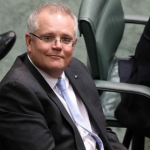The Crime of Inciting Hatred in Australia

A leader of the far-right in Australia, Blair Cottrell, has failed in his appeal against a conviction for inciting hatred, contempt or ridicule against people of the Islamic faith.
The offence
In September 2017, Mr Cottrell, along with two other far-right extremists, were convicted of religious vilification under section 8 of the Racial and Religious Tolerance Act 2001 (Vic) after filming and publicly posting a video beheading a dummy during a protest against the building of a mosque in Bendigo.
Also in the video, the men chant “Allahu Akbar” and spill fake blood on the footpath.
“We live in a community which is inclusive and that each individual deserves the right to live their life peacefully,” Magistrate Peter Hardy said during the Local Court hearing. “You more than just crossed a line.”
Each of the men were fined $2,000 and ordered to pay $79.50 in statutory costs.
It was the first prosecution under the section, and former President of Liberty Victoria, Professor Spencer Zifcak, made clear that the trios conduct went well beyond free speech and into the realm of hate speech, which is harmful to those targeted.
“It’s been well recognised for a long time that in international law and in domestic law in Australia, in relation to racial vilification, that hate speech of whatever kind ought not to be justified or covered just by saying its an example free speech,” he stated.
Freedom of political communication
Mr Cottrell tried to seek leave to appeal his conviction to the High Court of Australia on the basis that his conduct amounted to a form of political communication protected by the Australian Constitution.
As previously reported, free speech is not expressly protected by the Constitution. However, the High Court has implied a limited freedom of political communication into the document.
The test for determining whether any curtailment of speech – such as that contained in Victoria’s legislation – is constitutionally invalid is contained the case of Lange v Australian Broadcasting Corporation (1997), which is also known as the “Political Free Speech Case.” The judges in that case ruled that a law restricting speech is permissible if it has a “legitimate purpose” and fulfils two conditions:
- It is compatible with the maintenance of the representative and responsible government mandated by the Constitution, and
- It is “reasonably appropriate and adapted” to the fulfilment of a legitimate purpose.
The judges in Lange found that “the freedom of communication which the Constitution protects is not absolute. It is limited to what is necessary for the effective operation of that system of representative and responsible government provided for by the Constitution”.
Failed appeal
Mr Cottrell’s application to seek leave to appeal to the High Court was refused, and the matter then came before the Victorian Supreme Court.
Justice Lisa Hannan dismissed the appeal, finding that the correct jurisdiction was the County Court of Victoria and not the Supreme Court.
Her Honour explained that the case is not overly novel or complex, and that a number of factual matters would need to be determined by the County Court before an appeal could be fully heard by the Supreme Court regarding any mistake of law
Conflicting rights
Deakin University law associate professor, Theo Alexander, explains that the case is comparable to that of Isreal Folau in so far as both highlight the conflict between free expression and freedom against being vilified.
“There are similar fundamental arguments at play regarding important rights that individuals have within the community, those rights will come into conflict at times and … courts are required to resolve in favour of one right or the other,” he stated.
Mr Cottrell’s character
Mr Cottrell has a history of violence, which includes 2012 convictions for stalking his former girlfriend and her new partner, and arson for attempting to burn down the man’s house. He served four months in prison for those offences.
“Women have manipulated me using sex and emotion; demoralization,” he once wrote in a comment on a YouTube video, “and I have manipulated them using violence and terror. We use what we have got to get what we want.”
The next year, he was fined $1,000 and sentenced to seven days in prison for aggravated burglary, property damage, arson, testosterone trafficking, possessing a controlled weapon and breaching court orders
Cottrell has also expressed a desire to see a portrait of Adolf Hitler hung in Australian classrooms and for copies of Mein Kampf to be “issued annually” to students.
Racial vilification
Section 8 of Victoria’s Racial and Religious Tolerance Act 2001 provides that:
(1) A person must not, on the ground of the religious belief or activity of another person or class of persons, engage in conduct that incites hatred against, serious contempt for, or revulsion or severe ridicule of, that other person or class of persons.
Note
“Engage in conduct” includes use of the internet or e-mail to publish or transmit statements or other material.
(2) For the purposes of subsection (1), conduct—
(a) may be constituted by a single occasion or by a number of occasions over a period of time; and
(b) may occur in or outside Victoria.
In New South Wales, section 20C of the Anti-Discrimination Act 1977 provides that:
(1) It is unlawful for a person, by a public act, to incite hatred towards, serious contempt for, or severe ridicule of, a person or group of persons on the ground of the race of the person or members of the group.
(2) Nothing in this section renders unlawful:
(a) a fair report of a public act referred to in subsection (1), or
(b) a communication or the distribution or dissemination of any matter on an occasion that would be subject to a defence of absolute privilege (whether under the Defamation Act 2005 or otherwise) in proceedings for defamation, or
(c) a public act, done reasonably and in good faith, for academic, artistic, scientific or research purposes or for other purposes in the public interest, including discussion or debate about and expositions of any act or matter.
In addition to this, section 93Z of the Crimes Act 1900 now prohibits inciting or threatening violence against others on the grounds of race, religion, sexual orientation or HIV status.
The recently enacted provisions carries a maximum penalty of three years in prison and/or a fine of $11,000.
It applies to anything available to the public, whether transmitted electronically or digitally, in print, or delivered personally, covering communications posted on the internet, including on social media sites.







